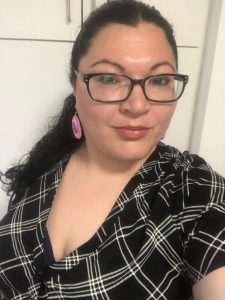Mitchell Hamline’s Indian Law Program will now be known as the Native American Law and Sovereignty Institute.
The commitment to this area of law has deep roots in both of Mitchell Hamline’s legacy schools, with Co-Director Colette Routel as the longest-serving steward of the program since it began in 2009. The change helps highlight the importance of sovereignty within Native American law, according to Co-Director Angelique EagleWoman. “Tribal nations have governed in this region and across the country since time immemorial. Our institute focuses on the sovereign-to-sovereign relationships of tribal governments in alliances and with the U.S. federal government.”
As one of fewer than 20 Indian law programs at law schools across the country, Mitchell Hamline’s institute focuses on students and practical legal education. The program includes two clinic options – one on impact litigation and another on tribal code drafting.
After two years as a visiting professor at Mitchell Hamline, EagleWoman became a full professor this year. A citizen of the Sisseton-Wahpeton Dakota Oyate, she was the first Indigenous law school dean ever in Canada, has served as a tribal judge, and co-wrote a go-to textbook for Indian law called Mastering American Indian Law. “Serving as the only Dakota woman law professor, it is truly meaningful to be in the Dakota homelands teaching law for the future generations of lawyers in the field, both Native and non-Native.”
With a distinguished career in litigation and teaching, Routel has testified before Congress on Indian Country-related legislation and has co-authored five U.S. Supreme Court amicus briefs over the past three terms, including a brief cited in the U.S. Supreme Court’s historic McGirt decision this year. She is working with clinic students on a treaty rights case involving several Wisconsin tribes, which is currently pending in federal court.
EagleWoman and Routel have a deep focus on helping students be successful in law school; coaching them in moot court competitions; and working to place alums after graduation. “We want to expand and continue to have a robust program that turns out lawyers who are rooted in serving their communities,” noted Routel.
 “I’ve wanted to earn a degree in Indigenous law since I was 12 years old,” said second-year student Angela Levasseur, a member of the Nisichawayasihk Cree Nation in Manitoba, Canada. “To be self-governing, self-sufficient, and self-determining, Indigenous nations must assert control of their affairs, and their justice systems.”
“I’ve wanted to earn a degree in Indigenous law since I was 12 years old,” said second-year student Angela Levasseur, a member of the Nisichawayasihk Cree Nation in Manitoba, Canada. “To be self-governing, self-sufficient, and self-determining, Indigenous nations must assert control of their affairs, and their justice systems.”
After receiving several degrees, Levasseur heard that her nation’s chief and council were recruiting citizens to attend law school so they could work for the nation as legal counsel in the future. A teacher and mother of five children, Levasseur enrolled in Mitchell Hamline because of its flexibility, which lets her still work full-time.
“I will be the lawyer for my people, which will be my dream come true.”
Levasseur is co-vice president of Mitchell Hamline’s Native American Law Student Association. This year’s NALSA president, Patti Buhl, had a long career in law enforcement, including as a police chief, before enrolling in law school. Earlier this year, she was named coordinator of the state of Oklahoma’s efforts to investigate and respond to cases of missing and murdered Indigenous persons.
Multiple alums work for tribal governments. When the Eastern Band of Cherokee Indians in North Carolina created their first legal assistance office, Bonnie Claxton ’13, a citizen of the Chickasaw Nation, became the first manager. Jessie Stomski Seim ’08, a Creek citizen, is general counsel for the Prairie Island Indian Community in southeastern Minnesota.
“There’s been a series of injustices for American Indian people since the founding of the United States,” said EagleWoman. “Although treaties were entered into, there are still a lot of issues to be addressed in realizing the full extent of treaty obligations between the United States and tribal governments.”
“It’s really hard to conceive practicing law in any state without knowing Indian law,” adds Routel. “There are 574 federally recognized tribal nations in the United States. Even if you never practice in a tribal court or work on an on-reservation financing project, for example – as tribes continue to expand their business holdings in an age of greater self-determination – knowledge of Native American law is essential.
“You can’t be an attorney in this state and not know these issues.”
Professors EagleWoman and Routel will host an open house on October 20 for anyone interested in learning more about Mitchell Hamline’s Native American Law and Sovereignty Institute. More information.




